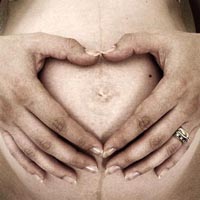Numerous Childbirths Increase Risk of Heart Disease in Women
A woman's risk of heart disease and stroke in middle-age and beyond may be associated with the number of children she gives birth to, a large study of Swedish women hints.

"Women having two births had the lowest risk of future cardiovascular disease," Dr. Erik Ingelsson, at Karolinska Institutet in Stockholm, said reporters, while women having five or more births had the highest risk.
Prior studies looking at ties between number of births and women's later risk of heart disease have yielded conflicting results. Most of these studies were small. Ingelsson and his colleagues looked for an association between number of births and heart disease risk in 1.3 million Swedish women after they turned 50.
During follow up lasting up to 23 years (average of 9.5 years), more than 65,000 heart disease-related events such as heart attack or stroke occurred, the researchers report in American Heart Journal.
Compared with women who gave birth twice (the lowest risk group), women with no, one, or three births had about 10 percent greater risk of future heart disease. The risk was 30 percent higher in women with four births and nearly 60 percent higher in women with five or more births.
The investigators found similar risks when analyzing a subset of nearly 600,000 women with complete pregnancy and birth records and at least one birth between 1973 and 2005. Taking into account pregnancy complications such as high blood pressure and pregnancy-related diabetes, and birth-related complications did not explain the link between number of births and later heart disease and stroke risk.
Pregnancy leads to marked changes in how blood flows in and through blood vessels, which can alter risk for heart disease and stroke. Ingelsson and colleagues say a better understanding of these changes may lead to a better understanding of heart disease and stroke in women.
American Heart Journal has contributed to the report.
Subscribe to Pravda.Ru Telegram channel, Facebook, RSS!





